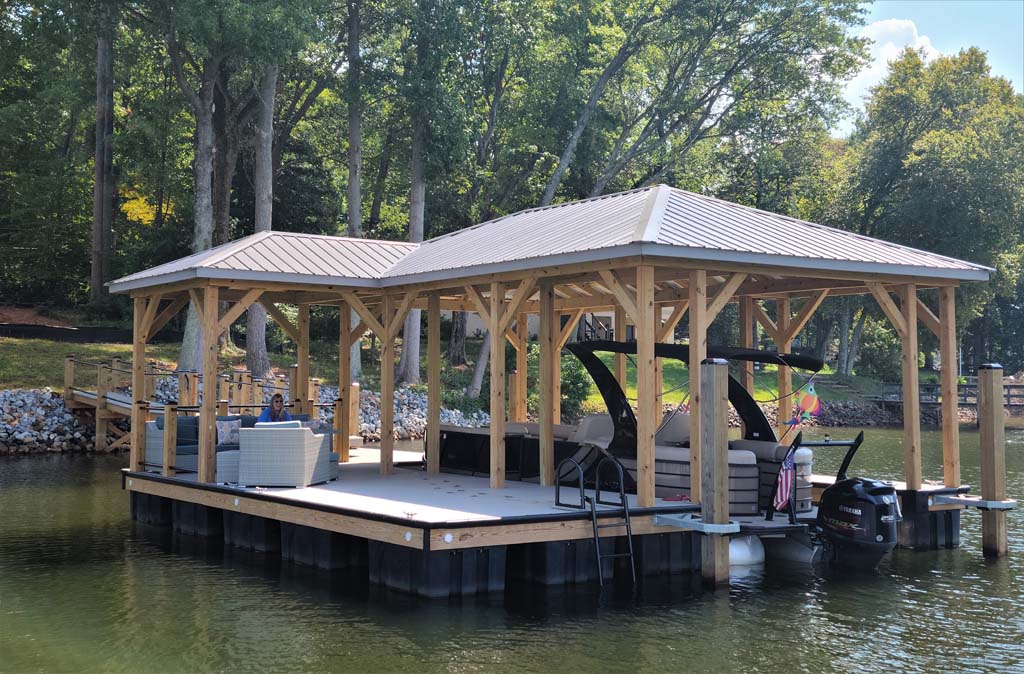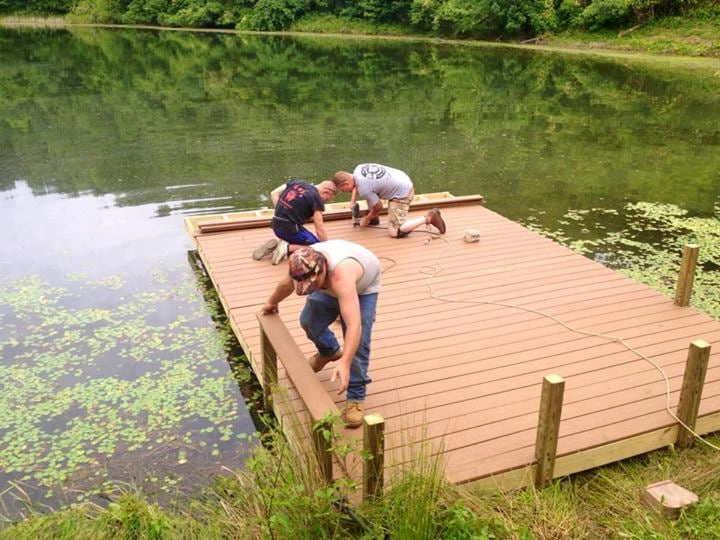Optimizing Your Outdoor Area with Specialized Floating Dock Solutions
Wiki Article
Floating Docks: The Ideal Selection for Versatile Water Access
Floating docks existing an engaging service for a selection of water accessibility needs, offering flexibility that goes beyond standard mooring choices. The modular nature of floating docks promotes personalization, catering to particular needs.Benefits of Floating Docks
Floating docks deal countless advantages that enhance water gain access to for numerous applications. Their capacity to fluctuate with altering water degrees makes them specifically helpful in atmospheres with rising and fall tides or seasonal variants. This adaptability ensures that vessels can easily moor without worry for the water's depth, supplying a reputable system for entertainment, commercial, and commercial uses.Additionally, floating docks are usually created from resilient materials that stand up to deterioration, making them suitable for long-term usage in marine atmospheres. Their setup is usually less intrusive than conventional set docks, lowering the ecological influence and assisting in quicker release (floating docks). This adaptability permits for easier moving or reconfiguration according to customer needs or environmental adjustments
Safety and security is an additional essential benefit; floating docks can provide steady access for individuals disembarking or boarding from watercrafts and decrease the risk of accidents related to unpredictable surfaces. They can be created to accommodate a selection of accessories, such as fenders and cleats, improving capability. On the whole, floating docks represent an efficient option for improving water gain access to across varied fields while advertising security and ecological sustainability.

Kinds Of Floating Docks
Numerous sorts of floating docks accommodate different requirements and settings, each designed with specific functions to enhance capability. The most typical types consist of modular docks, which are composed of interlocking sections that permit easy modification and expansion. These docks are suitable for leisure use, as they can be customized to fit different boat sizes and water problems.One more preferred alternative is the stationary floating dock, which stays secured in location however drifts with transforming water levels. floating dock builder. This type is especially fit for locations with minimal tidal fluctuations, offering secure access for angling or swimming. Additionally, there are drive-on docks, which include a sloped layout that enables boats to conveniently drive on and off, making them appropriate for individual watercraft and smaller sized vessels
For industrial applications, durable floating docks are offered, constructed from strengthened products to stand up to substantial tons and rough aquatic atmospheres. Last but not least, environment-friendly floating docks utilize lasting materials and styles to lessen environmental effect, frequently incorporating attributes like greenery to sustain regional wildlife. Recognizing the various kinds of floating docks makes certain that individuals can choose the most appropriate solution for their specific requirements.
Setup Refine Introduction
An effective installation of floating docks calls for careful planning and focus to detail to ensure optimal performance and safety and security. The initial action entails analyzing the site conditions, including water depth, current, and prospective challenges. This evaluation educates the option of the proper dock products and style tailored to the details atmosphere.Next, getting essential permits is critical, as several jurisdictions have laws regarding building and construction on water bodies. Once permissions are secured, the setup can continue. Begin by preparing the foundation, which may involve anchoring systems or pilings tailored to use this link the dock kind and regional conditions.
Following the structure arrangement, assemble the dock sections according to manufacturer requirements. Ensure that all components are firmly fastened and lined up to withstand environmental anxieties. Setting the dock in the designated area, guaranteeing it is level and steady.

Upkeep Tips and Ideal Practices
After the installation procedure is full, ongoing upkeep plays a crucial function in ensuring the durability and capability of floating docks. Routine inspections ought to be carried out to recognize any kind of indicators of wear, damage, or damage - floating docks. Check for any kind of loosened installations, cracks, or separation in the dock areas, as these can jeopardize architectural honestyCleaning the dock is important to get rid of debris, algae, and other accumulation that like this can influence its appearance and safety. Use a gentle pressure wash occasionally to keep cleanliness without causing damage to the surface. Additionally, applying a safety sealant every couple of years can aid boost longevity and stand up to environmental wear.
Take note of the mooring lines and anchors, guaranteeing they are totally free and safe and secure from rust. Change any degraded parts promptly to stay clear of threats. Seasonal changes may additionally be required; throughout severe climate problems, rearranging or reinforcing the dock can avoid damage.
Applications for Floating Docks
Floating docks offer a wide range of applications, satisfying both leisure and industrial requirements. In leisure settings, they offer seamless accessibility to waterways for tasks such as boating, angling, and swimming. Their flexible nature permits for installation in differing water levels, guaranteeing steady and safe accessibility despite tidal changes.Commercially, floating docks are vital for marinas and waterfront organizations. They help with the docking of vessels, enabling efficient loading and discharging of products. Their modular design allows for easy expansion or reconfiguration to accommodate transforming service needs, making them excellent for boat services, scenic tour operations, or angling charters.
In addition, floating docks are made use of in environmental applications such as water study and habitat repair. They can offer as platforms for scientific researches, checking water top quality, or performing wildlife studies without troubling delicate environments.
In commercial contexts, floating docks are utilized in construction jobs, providing access to hard-to-reach locations for equipment and personnel. Their flexibility, durability, and minimal effect on the environment make them an ideal option for a broad array of applications, enhancing both functionality and ease of access in various water-based environments.
Verdict
In final thought, floating docks represent an optimum option for varied water accessibility requires, owing to their flexibility, resilience, and modular style. Floating docks offer next as a valuable property for recreational, commercial, and environmental tasks, making certain trustworthy access to rivers and advertising lasting techniques in marine atmospheres.Floating docks present an engaging service for a selection of water accessibility needs, supplying versatility that goes beyond typical mooring alternatives.Floating docks offer countless advantages that enhance water accessibility for numerous applications. Overall, floating docks stand for an efficient option for enhancing water gain access to across varied industries while promoting safety and ecological sustainability.
Another preferred alternative is the stationary floating dock, which continues to be anchored in location but drifts with changing water degrees.In conclusion, floating docks represent an optimal service for varied water gain access to requires, owing to their versatility, toughness, and modular style.
Report this wiki page